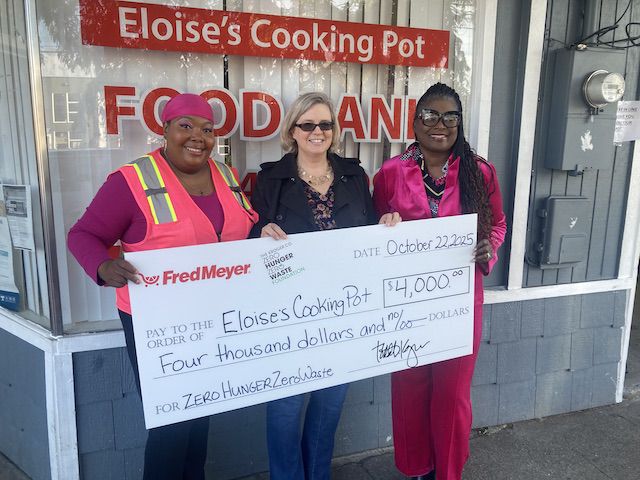
Tiffany Sanders, Public Affairs Manager with Fred Meyer and QFC (middle), presented the
donation to Eloise’s Cooking Pot Food Program Manager Atienne Howard (left) and
Making A Difference Foundation President and CEO Ahndrea Blue.
When at the grocery store check-out, oftentimes the cashier will ask if you would like to round up your total purchases to an even dollar amount for charity. But where does this money go? At Fred Meyer and QFC stores, it goes directly back into the local community, and this resulted in a $4,000 grant to Eloise’s Cooking Pot food bank on Oct. 22.
There to present the gift was Tiffany Sanders, Public Affairs Manager with Fred Meyer and QFC. Sanders said she was happy to shine a light on the important work that the food bank and its dedicated crew are doing which parallels Fred Meyer and QFC stores commitment to help end hunger across Tacoma and Pierce County.
“Those pennies that people donate when they round up their purchases really add up,” Sanders said. “Fred Meyer and QFC customers are incredibly generous, and our store associates live in the communities they serve so they are passionate about making sure everyone has access to food, not just those who shop with us.”
The funds collected go directly to local nonprofits fighting hunger. “We use those donations to issue grants that stay in the community,” she added. “They support wonderful organizations like Eloise’s Cooking Pot, which are doing truly impactful work to help feed local families.”
The donation was made through the Kroger Company’s Zero Hunger Zero Waste Foundation which directs grants to support national and local organizations that focus on increasing food access in communities. Kroger’s Grocery Rescue Program is among the foundation’s initiatives in which surplus, unsold, and fresh food is donated to local food banks and hunger relief organizations instead of being wasted.
Eloise’s Cooking Pot is part of the Making A Difference Foundation and its president and CEO Ahndrea Blue told of how far $4,000 can go.
“For every dollar, we’ll be able to procure at least 10 more pounds of food so it will help us a long, long way,” she said. “We’ll end up with 40,000 pounds of food so this is huge.”
While at the site, Sanders stayed a while to have a tour and see the work that’s being done. Blue took Sanders on a walk through the food bank and its developing space just up the same block that will expand Eloise’s Cooking Pot from about 300 square feet to 5,000 square feet as a no-cost market that, if all goes according to plan, should be open in the beginning of 2026. It will look and feel like a typical market which is a matter of dignity that Eloise’s strives to ensure for everyone who comes.
A BIPOC farmers market will also be forthcoming for local growers to sell their yield to Eloise’s then be given to its clients. This is a big deal considering that Eloise’s Cooking Pot is located within a food desert.
“We will basically become people’s primary food source. We want Eloise’s to be a place where people choose to come to. We want our food to be that good,” Blue said.
At Eloise’s, clients choose their own food, and this includes perusing large bins of fresh produce that they can pick from. Culturally relevant foods are a priority, so Eloise’s offers a variety of meats like pork, beef, lamb, and prime cuts as well.
“If you want a steak, you should have a steak,” Blue said. “We can’t have one type of rice or one type of beans, and we pay for 50 percent of our food and the other 50 percent is donated. We believe that people are entitled to eat the types of food they would normally eat, and they have a right to tell us what that food is. Eloise’s belongs to the community; it belongs to the people. We just have the privilege of serving them.”
Eloise’s gives more than food. Items most needed right now are baby formula, larger sized diapers, and hygiene items for those who are in housing transition. Learn more at themadf.org/eloises-cooking-pot.
